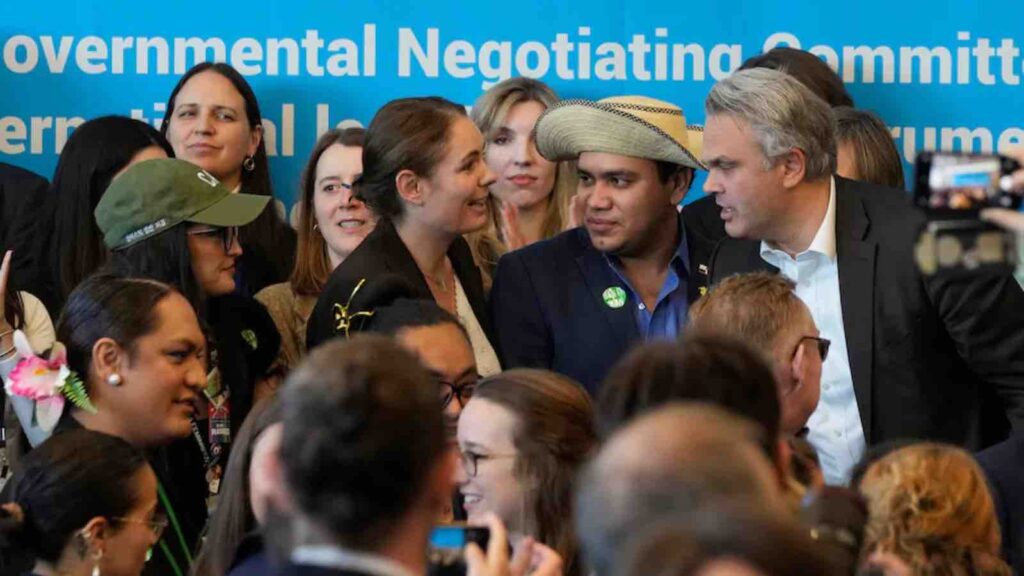Global Plastics Treaty stalls: what’s next for tackling plastic pollution?
BUSAN, South Korea — The dream of a landmark global treaty to curb plastic pollution crumbled under the weight of disagreement as talks involving delegates from over 170 nations fell apart this week. Hopes for a binding agreement were dashed after seven days of marathon negotiations ended in an impasse, with nations sharply divided on whether the solution lies in limiting plastic production or merely managing its waste.
RELEVANT SUSTAINABLE GOALS



The collapse highlights the intractable challenge of addressing plastic’s role in the modern economy—ubiquitous, profitable, and polluting.
The Mountain of Plastic Waste
The urgency is undeniable. Each year, more than 450 million metric tons of plastic are produced, with 350 million tons discarded as waste. Most of this waste ends up in landfills or is incinerated, with less than 10% recycled. Meanwhile, mismanaged plastic infiltrates rivers and oceans, devastating ecosystems.
The stakes extend beyond pollution. Plastics, largely derived from fossil fuels, contribute significantly to global greenhouse gas emissions. Yet, as the talks demonstrated, solutions are politically fraught, pitting economic interests against environmental imperatives.
A Fractured Consensus
The talks split into two camps. A coalition of over 100 nations, led by Norway and Rwanda and supported by advocacy groups like Greenpeace, pushed for bold measures to restrict plastic production, ban toxic chemicals in consumer products, and enforce global compliance. They argued that only a fundamental shift in plastic usage could curb its harmful effects.
Opposing them were oil-rich nations such as Saudi Arabia and trade groups like the American Chemistry Council, which advocated for a voluntary treaty focused on improving waste management. “If you can stop plastic pollution, there should be no problem with producing plastics,” said Saudi delegate Abdulrahman Al Gwaiz, echoing the industry’s preference for a less restrictive approach.
The United States, the world’s largest contributor to plastic waste, sought a middle ground, supporting reductions in plastic pollution but opposing mandatory production caps. The looming return of Donald Trump to the White House cast a shadow over the proceedings, with some negotiators fearing U.S. disengagement under a more industry-friendly administration.
The breakdown in Busan comes after two years of intensive negotiations initiated by the U.N. Environment Assembly in 2022, which aimed for a binding treaty by 2024. Despite a near-universal acknowledgment of the plastic crisis, delegates left South Korea without a deal, with many expressing frustration and anger.
Panama’s Juan Carlos Monterrey Gómez called the failure “a moral failure,” pledging to continue the fight for ambition. His sentiments were echoed by Rwanda’s Juliet Kabera, whose rallying cry for stricter measures received a standing ovation from many in the room.
Economic Growth vs. Environmental Necessity
The stalemate underscores the tension between economic development and environmental responsibility. Developing nations and oil-producing states argued that limits on plastic production could stymie economic progress. “The solutions in the past century have always come from technology,” Al Gwaiz contended, emphasizing the need for innovation over restriction.
Despite the collapse, there were signs of progress. Negotiators managed to shrink the draft text from 73 pages to 22, indicating a narrowing of disagreements. South Korean Foreign Minister Cho Tae-yul, whose country hosted the talks, urged delegates not to lose momentum, calling compromise “a sign of strength.”
Countries agreed to reconvene next year, using the current draft as a foundation for future negotiations. Advocacy groups remain cautiously optimistic. Ocean Conservancy’s Anja Brandon urged the U.S. to stay engaged, noting widespread public support for tackling ocean plastic pollution.
Lead image courtesy of Lorenza Cotellessa. all other images courtesy of Beagle Button.
You may also be interested in :
Emerging Markets Receive Only 6% Of Global Plastic Waste Investments, Report Finds




